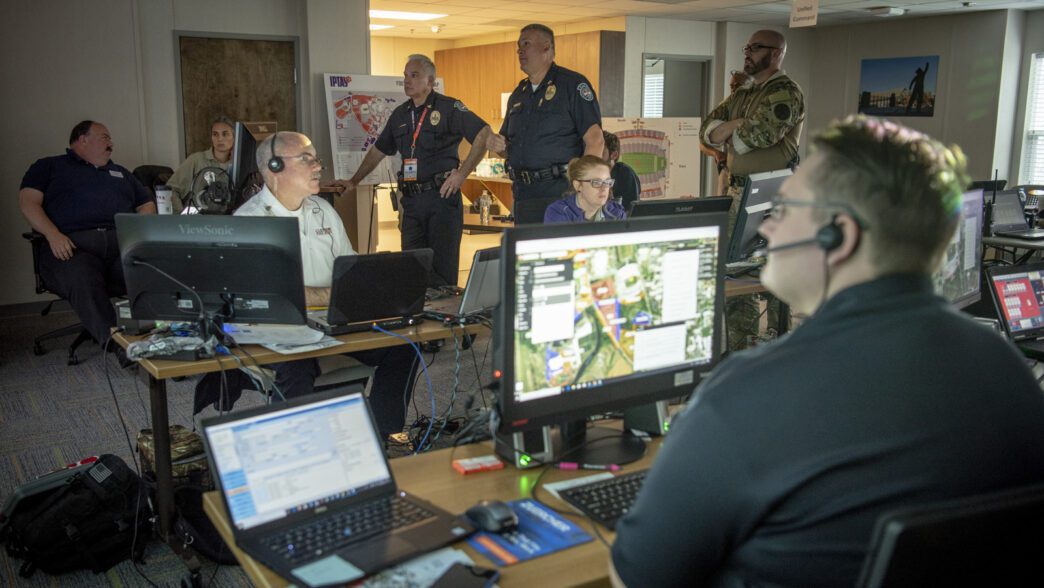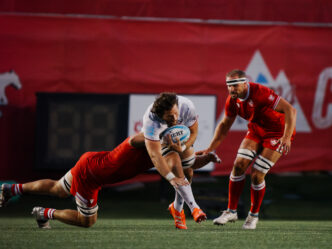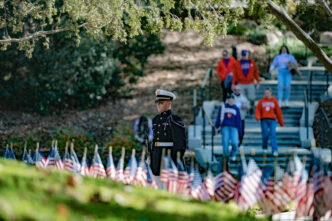Six or seven Saturdays a year, more than 100,000 people migrate to the Clemson University campus to experience the kind of good time only found in American football towns. Rivers of orange stream from all directions to pool seven stories high in Memorial Stadium as the Clemson Tigers play. Football is not just a game in Tigertown: It’s a culture. And it’s a blast.
On game days, every square inch of Clemson’s 1,400-acre main campus is divided up and claimed by someone. Fans start arriving well before opening kickoff to tailgate, socialize, and revel in the unprecedented success that has surrounded their team in recent years. Food sizzles on grills, music drifts through the trees and smiles and laughter are everywhere.

Behind the scenes, another world-class team has been assembled to direct and watch over the proceedings – quite literally from cameras mounted all over campus – and ensure the safety of the thousands of people who’ve gathered for the day.
This team is made up of A-list talent from a wide range of emergency and first responder organizations including the Clemson University Police, Fire, EMS and Emergency Management departments; the city of Clemson Police Department, the State Law Enforcement Division, the South Carolina Highway Patrol and National Guard; University Parking and Transportation and IT support; and officials from surrounding counties.
They convene in a nondescript building just off campus in a room that could be a movie set; with walls of video screens, and rows of desks dotted with computer monitors and communication equipment. They call it the Incident Command Center. Signs overhead stake out desk space for “IT,” “SLED,” “University Communications” and a dozen others. The room buzzes with professionals dressed in full police and Army combat gear mingling with civilians in business casual and Clemson orange attire.
At the helm of the ship is Clemson University’s new police chief and associate vice president for public safety Greg Mullen, who joined the Student Affairs Division executive team in May from Charleston, where he was the top cop for 11 years.

“We’ve created this space so all the different entities that would be involved in any kind of critical response are in one place and we can have an organized plan,” said Mullen. “Each one of the people that you see here has a very important role in how that all comes together. If we should need some sort of response, we can do it in a very organized and planned way, so we have the least amount of disruption or injury as possible.”
The crisis team reports well before the game begins, when the roads onto campus are still free of traffic. As cars begin funneling onto campus and Tigers fans start setting up in their designated tailgating areas, Mullen and Clemson police Capt. Brad Rhodes stand in the middle of the room and study two huge screens fed by dozens of cameras.
James Gowan, physical security coordinator for CUPD, sits at a desk to the side and controls the cameras scattered all over the campus. With a push of a button he flicks from one scene to another: traffic check points, Bowman Field, entry gates, parking lots. If someone in the room catches something that doesn’t look quite right, he can freeze it and zoom in close enough to read a ticket stub.
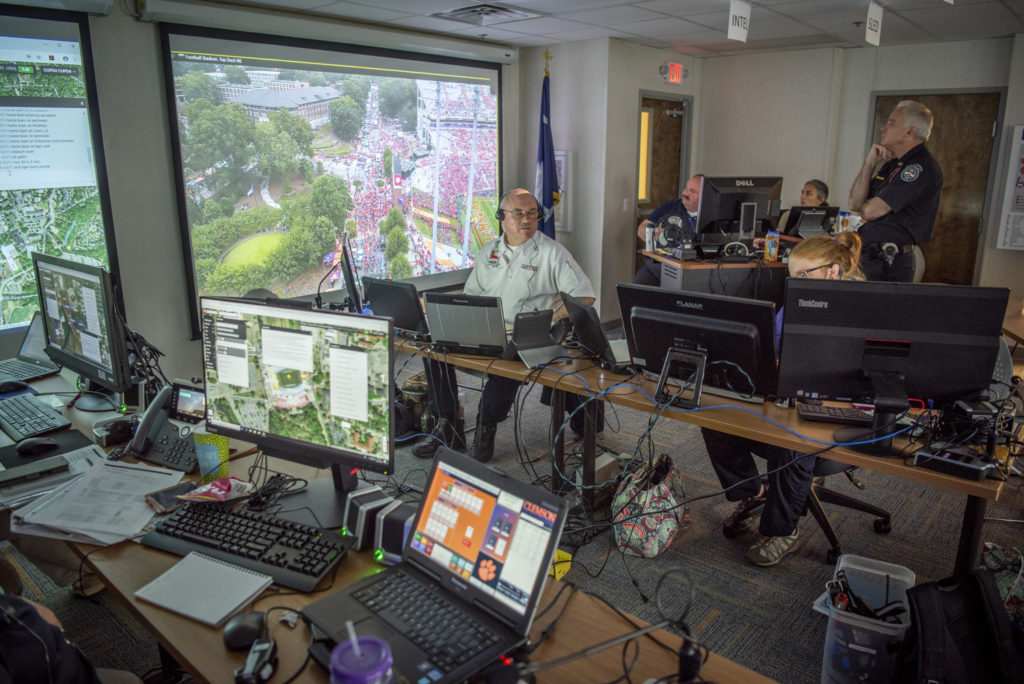
As Mullen and Rhodes study the screens, other people in the room check wireless signal strength, monitor the weather, track 911 calls and – a big one – control traffic flow.
“You’re taking 100,000 people and putting them in a very small space on game day, they are expecting a safe experience, and traffic is a huge part of that,” said Mullen. “We have visuals that allow us to organize all of the different response components. We can visually see it here in our command center if a road’s moving well, and if it’s not we can implement processes to help it move better. As the events of the day occur, we need to make sure we keep cars away from all the pedestrians that move in. It’s a really big operation.”
Outside the room, more than 300 police, fire, EMS and military responders are stationed in strategic locations and take direction from Mullen and his partners in the Incident Command Center. Mullen explained how Clemson collaborates with many different entities to muster an army of that size.
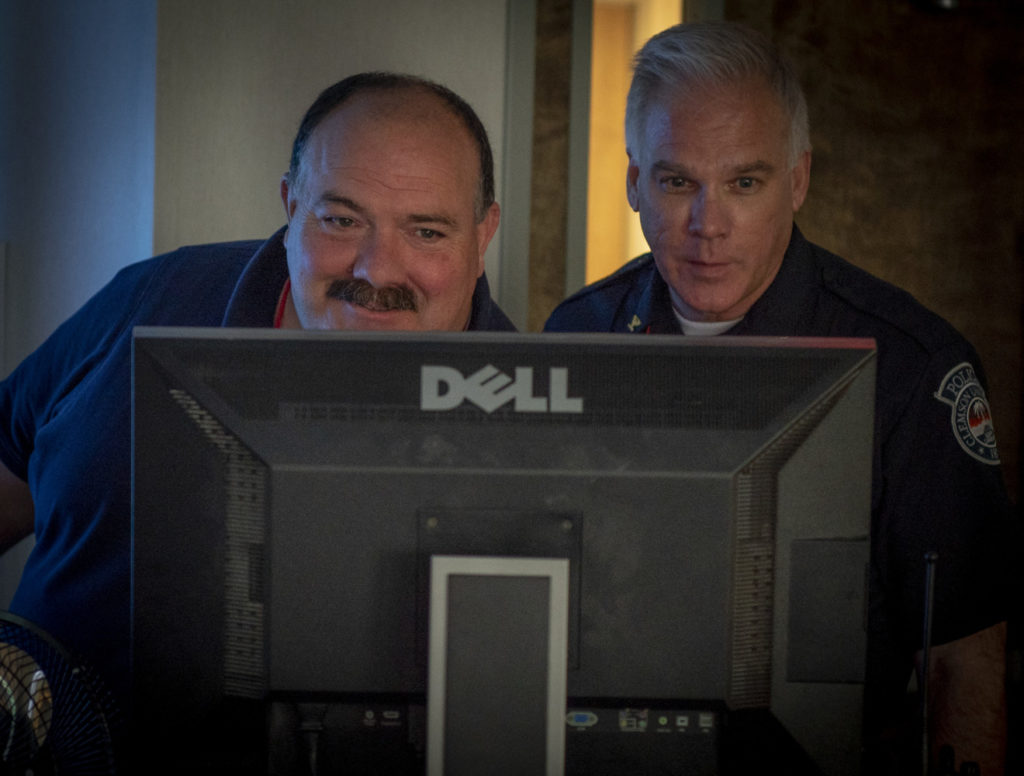
“We have partners from pretty much every jurisdiction that touches the university: Anderson County sheriffs, Pickens County sheriffs, Oconee County sheriffs, Clemson PD, Easley PD, Anderson PD – all of our mutual aid partners are very important,” said Mullen. “Fire and EMS actually has people that come from as far away as Charleston to work with them on game day, so we have the staff necessary to put on an event like this.”
As the day goes on and cheers rise from Memorial Stadium as the Tigers rack up the points, the atmosphere in the command center keeps steady. Most of the workers here are Tigers fans, of course, but they remain serious and focused, worrying about the worst-case scenarios that unfortunately have to be considered in a post-9/11 world. The Tigers’ National Championship win in 2016 also added some security concerns, said Mullen.
“The Tiger Paw has never been more valuable than it is today,” Mullen explained. “The brand of Clemson has really been elevated, and with that popularity and success comes some added risk.”
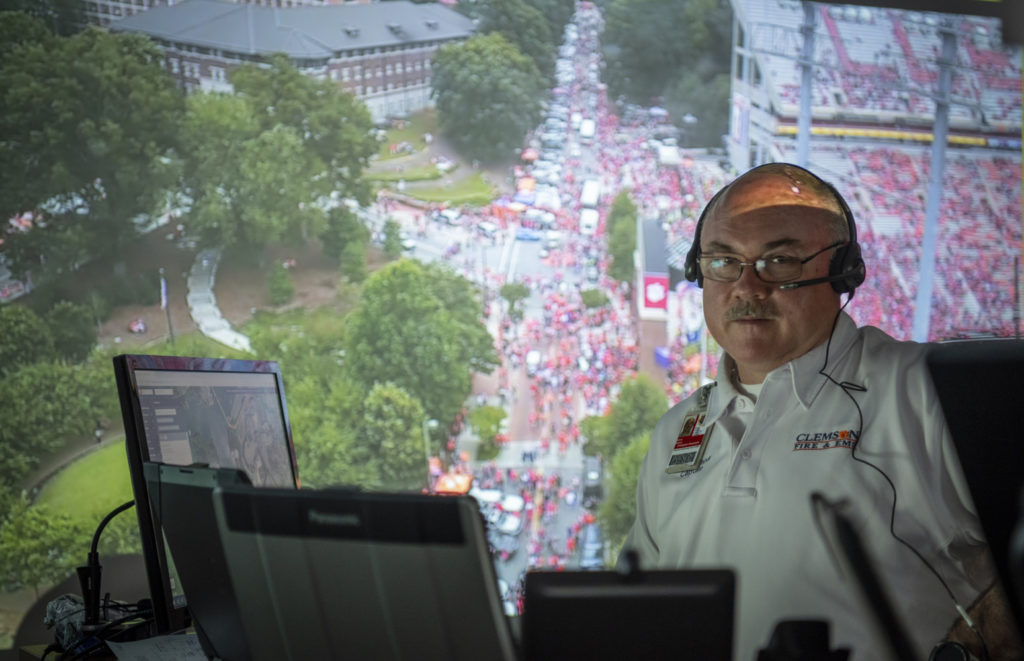
Sadly, Mullen has had experience managing a heart-wrenching crisis, as he led Charleston’s police department through the aftermath of the 2015 shooting at Emanuel AME Church that left nine members of a Bible study dead. It’s experience nobody would ask for, but that first responders like Mullen are prepared to deal with in order to serve the people they have sworn to protect. He uses his experience to keep his team ready.
“It could be a terrorist attack or some sort of incident that we hopefully never have, but we’ve got to be prepared,” he said. “I think it’s really important for people to know there are a lot of things that happen behind the scenes to make these events as safe and secure as they are. It takes a lot of people, a lot of planning, and a lot of training. I’m really proud of all the effort and hard work this team puts in. Game days are exactly what they should be because of them.”


